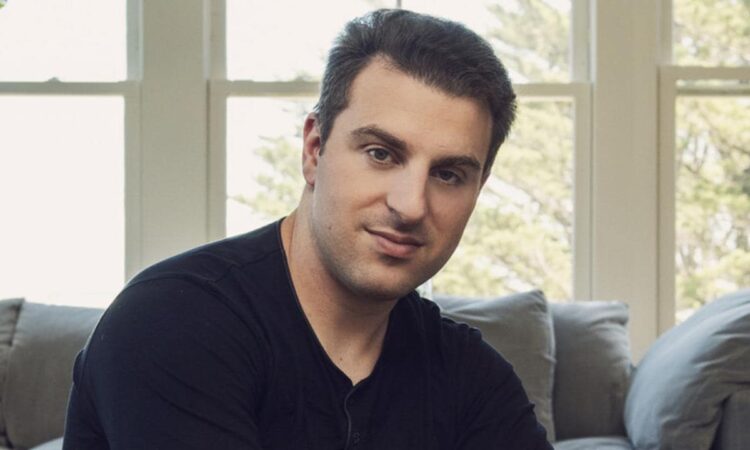At the height of the coronavirus pandemic, travel businesses around the world went into free fall.
Flights were grounded, hotels turned into quarantine sites, cities became ghost towns and with customers hunkering down at home rather than going on holiday – revenue for the world’s biggest accommodation provider tumbled 72 per cent year on year.
As the world starts to reopen, including Australia’s internal borders and forecast for overseas travel in 2022, Airbnb has announced more than 100 new changes and updates to its platform that will not only impact guests – but hosts as well. The changes are what CEO and co-founder Brian Chesky says will gear up the company for the new era of global travel.
RELATED: Where returning Australians will go first
Airbnb said the past year had forced the accommodation and experience provider to focus on flexibility for guests and accessibility for hosts. Picture: Waldo Swiegers/BloombergSource:Supplied
RELATED: Australians to be jailed or fined if they fly in from India
Airbnb said the past year has forced the accommodation and experience provider to focus on flexibility for guests in terms of destination, dates and listings, while hosts will now be able to list their property in 10 simple steps.
Speaking to news.com.au, the 39-year-old billionaire said the world of travel was seeing “three fundamental shifts in travel as people become less tethered and more flexible”.
“People have realised they don’t need to all live in a city and be so closely tethered,” he explained.
“They can live, work and travel more places … and this is creating big trends because people can travel any time now and much more than they used to.”
RELATED: Josh Pieters & Archie Manners list doll’s house on Airbnb
Airbnb co-founder and CEO Brian Chesky said travel as we know it will never be the same again. Picture: SuppliedSource:Supplied
But Mr Chesky said that since the pandemic began, his business has pivoted from international to more domestic dominated.
It’s a trend he warned that even by 2022 when Australians will likely be able to travel abroad once again – will never be like what we experienced in a pre-pandemic world.
“In a world of more flexibility, we are never ever going back to the world of 2019,” he said. “The world is never going back to 2019. And if the world is never going back to 2019, it means the world of travel is not going back to 2019.
“We are in a whole new world and we are never going back. Travel and living will continue to blur together and people will increasingly have fewer one year leases.
“Fewer people will think travel is something you do one or two nights, and you will see longer and longer term stays by living nomadically and less tethered.”
Mr Chesky said the way the world knew travel is over.Source:Supplied
Brian Chesky is the CEO and co-founder of Airbnb.Source:Supplied
In the past six months since travel has somewhat rebounded as people started working remotely – often away from home – and Australians are faced with softer internal border measures, Mr Chesky said one of the biggest change in store for the world is the slow decline of travel for business.
Mr Chesky said he believed three main trends would continue long after coronavirus ended: People will travel less for business and more for pleasure, more travellers will look outside top destinations and consider smaller communities, and they’ll be more interested in meaningful travel versus tourist spots.
Australia’s capital cities have been the hardest hit regions around the country, given many are choosing to jump in their car and visit a new town outside the busy cities.
Tourism Australia recently launched a campaign to encourage city escapes rather than regional stays to bring some love back to the big smoke, given cities have been losing people in record numbers during the pandemic.
Rural Airbnb offerings will likely continue to soar in 2021. Picture: Emma BrasierSource:News Corp Australia
The trend of farm stays, cabins, caves and even tree houses have surged in 2021. Picture: airbnb.Source:Supplied
Spending on overnight trips across Australia fell by $27.1 billion, or 34 per cent, in the year ending September 2020, compared to the previous year.
It has especially been felt in Melbourne, Sydney, Brisbane, Gold Coast and Perth, with Airbnb’s report on ‘Travel and Living’ indicating that rural nights booked in Australia jumped from 18 per cent for winter 2019 to 42 per cent in 2021.
But given business travel is likely to be “changed forever” – Mr Chesky says the likelihood that city hosts will continue to take a hit financially remains prominent until borders open.
“Travel and living are starting to blur together,” Mr Chesky said.
“Hosts in cities all over the world have taken a hit, while hosts outside of the cities have seen more business than they ever have. The pandemic lead to the acceleration of adoption of the internet to really fundamentally change travel in a way we have never seen, and I don’t think we are ever going back to the world of 2019.
“This is the biggest change in travel since WWII.”
trending in travel
Source: Read Full Article







